Stop your husband from dying… without him realising. Experts reveal the tiny tweaks that will make a huge difference to his health, from a very clever mirror trick to the supplement you should slip into his dinner
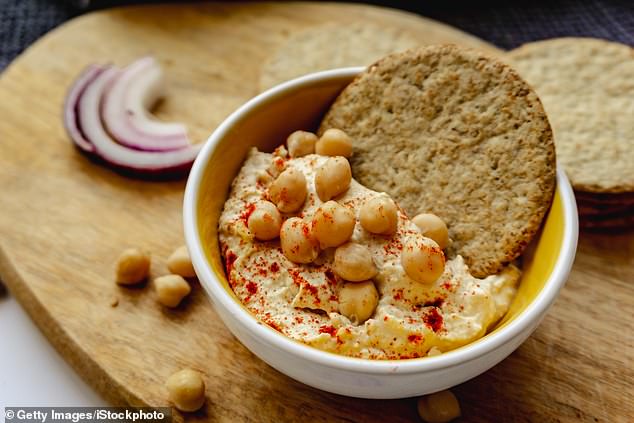
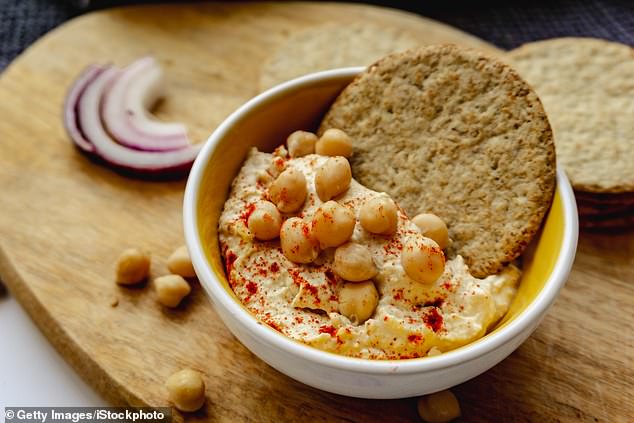







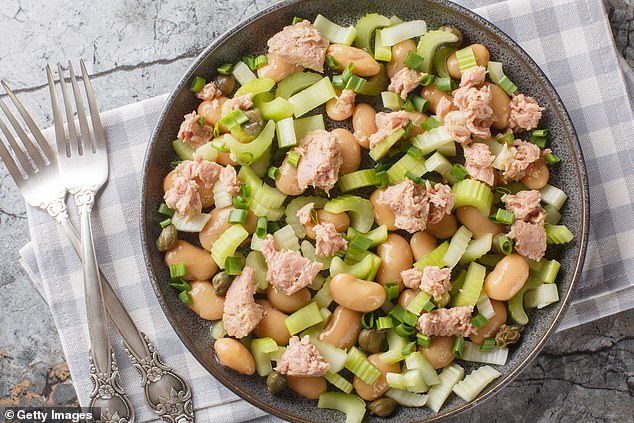


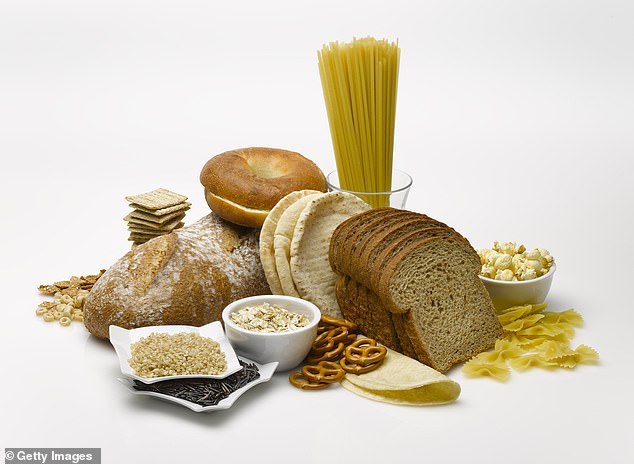
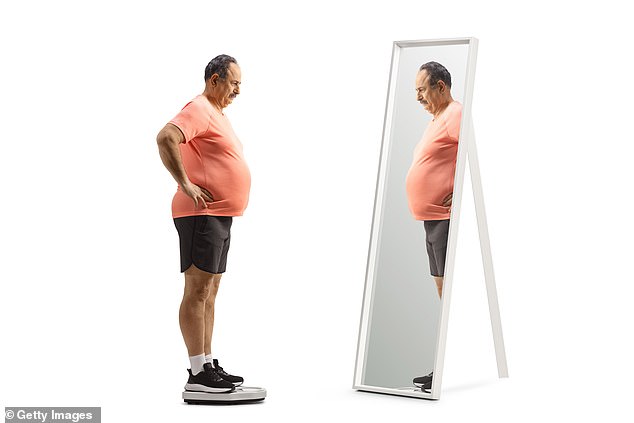
Middle-age is a dangerous life stage for all of us, but it’s a time when men, in particular, start to become more prone to the effects of age-related illness.
While women are not immune to health problems, the statistics for men are particularly shocking – 42 per cent of men die before the age of 75, compared with 26 per cent of women, according to the Royal College of GPs.
Men are also 60 per cent more likely to develop the types of cancers that affect both sexes, and 70 per cent more likely to die from them.
And those with a beer belly have a higher chance of developing a number of conditions. Fat around the middle is particularly harmful to health, raising the risk of chronic diseases, such as type 2 diabetes and heart disease. A major study from the US found having a fat tummy was more deadly than being obese all over.
There is much a man can do to protect his health through diet, exercise and stress-reduction. But men are notoriously impervious to health advice (for instance, men use GP services 20 per cent less than women, while pharmacy services see an even bigger gender discrepancy).
But there are ways to introduce a healthier lifestyle to your partner by stealth…
Switch from biscuits to oatcakes

Dietitian Sian Porter suggests swapping biscuits for oatcakes with hummus or peanut butter, and opting for berries on porridge, rather than honey or syrup
Excess sugar can lead to weight gain, obesity and increased risk of type 2 diabetes. It is also now being directly blamed for high blood pressure.
Even one sweetened soft drink is enough to raise blood pressure in otherwise healthy people, according to research in the journal Metabolism.
Other studies have suggested high sugar levels affect a key area of the brain (the hypothalamus) and cause heart rate to quicken and blood pressure to rise.
Another way sugar might affect blood pressure is its effect on insulin levels; raising these may in turn speed the heart rate and contribute to inflammation and damage to delicate arteries.
The worry is that high blood pressure is a major factor in strokes – and strokes kill more men per year than prostate and testicular cancers combined.
So how can you cut back on his sugar intake? If you bake at home, use slightly less sugar; use a smaller spoon for sugar in tea or coffee; and mix ‘no sugar added’ cereal 50:50 if the household has a high-sugar favourite.
Dietitian Sian Porter suggests swapping syrup or honey on yoghurt or porridge for berries (fresh or frozen), and switching biscuits for oatcakes with hummus or peanut butter.
Stealth sugar-reduction works – a study in the American Journal of Clinical Nutrition found that after two months on a lower-sugar diet, participants perceived sugary foods to be 40 per cent sweeter than before.
Buy him some training gear

Married couples who embark on any exercise campaign together have been found to end up with much higher attendance and lower drop-out rates
Couples who exercise together massively increase their chances of getting – and staying – fit. A study of 3,500 British couples working to reduce their risk of heart disease found the men who benefited the most had regularly active partners.
Another study found married couples who embarked on any exercise campaign together ended up with much higher attendance and lower drop-out rate than married people who participated alone (6 per cent of exercising couples dropped out, compared with 43 per cent of couples who exercised alone).
It sounds simplistic but getting a man back into sport might be easier if you buy him a new bit of kit.
‘Men are competitive by nature and he’ll not take part in a sport if his kit isn’t as good as – or better than – everyone else’s,’ argues Dr Michael Sinclair, lead consultant psychologist at City Psychology Group. So that could mean anything from high-tech waterproof gear to ‘essentials’ such as noise-cancelling headphones.
Pick an argument – or read out loud

Simon Wootton says one of the best ways to increase cognitive capacity is through ‘meaningful conversation’, or heated discussion
Studies show people who keep their brains active reduce their risk of developing dementia.
When pathologists dissect the brains of people who stayed mentally active into old age (with no signs of dementia), they still find the plaques that typically signify Alzheimer’s.
In other words, mental activity seemed somehow to over-ride the dementia process.
Brain-training specialists Terry Horne and Simon Wootton (trained chemists and co-authors of Build Your Brain Power) worked with neuroscientist Baroness Susan Greenfield on the theory that forcing your brain to work harder increases your cognitive capacity and helps boost your memory potential.
Simon Wootton says one of the best ways of doing it is through ‘meaningful conversation’ (i.e. argument).
Indeed brain scans show that while screen-based activities, such as watching videos or TV, do not involve many areas of your brain, activities that involve thinking aloud, especially with another person, cause many different parts of your brain to interact – thereby increasing your cognitive capacity.
‘A heated discussion is a brilliant brain training activity because it combines old and new information (‘you always . . . you never’), but mixes it up in an analytical way,’ says Simon Wootton, suggesting reading out loud to each other as an alternative.
‘Reading helps protect against dementia because it forces your brain to map, connect and cross-check information and then integrate it with information already in your memory,’ he says.
‘Reading out loud magnifies this brain benefit – and discussing what you are reading spreads the neural load wider still.’
Unravel his health ancestry

If a man’s parents, grandparents or other relatives have had heart disease, diabetes or stroke, his risk will be much greater
If your partner is over 45 he’ll have two big unavoidable risk factors for heart disease – gender and age, but he might not be aware of another major contributor: family history.
Do a bit of subtle digging if you don’t already know if his father or brother had a heart attack before the age of 55, or his mother or sister had one before the age of 65, for instance.
If his parents, grandparents or other relatives had or have heart disease, diabetes or stroke, his risk will be much greater.
A good family history can be a poor man’s gene test, and gently pointing this out to him might provide the impetus he needs.
But don’t mention the ‘diet’ word
Although 69 per cent of men in England are overweight or obese, compared with 59 per cent of women, it is less likely to be the men who worry about being overweight or get involved with weight-loss services.
‘The problem is that terms such as ‘diet’ are not considered “manly”,’ says Jane Ogden, a professor of health psychology at the University of Surrey.
She recommends finding other ways to discuss the topic and rather than talking about ‘counting calories’ or ‘being on a diet’, talking around the subject in terms of ‘looking after yourself’ or ‘getting fit’ instead.
Buy him a blood pressure kit

Regular home checks can help control blood pressure and monitor for risks of heart disease and stroke
Blood pressure tends to rise with age, increasing the risk of heart disease and stroke – with men more at risk than women from both.
Research shows regular home checks can help blood pressure control.
In a study published in the Journal of the American Medical Association, researchers took 450 people with high blood pressure and gave half at-home kits and asked them to record their levels daily for a year.
They found that 72 per cent of those with home kits got their blood pressure under control compared to 57 per cent of the control group.
The charity Blood Pressure UK recommends a machine that monitors blood pressure in your upper arm (not wrist or finger, as results tend to be inconsistent), and that has been ‘clinically validated’ by the British Hypertension Society (see bhsoc.org for a list).
Book shorter holidays

Experts recommend one long weekend break every six to eight weeks, and evenly spaced one-week holidays throughout the year
You’d think a holiday would be a great way to help your partner de-stress. But studies have found a two-week ‘break’ can compound stress levels because preparing for a long holiday then trying to catch up with your life when you get back can be stressful.
When researchers in the Netherlands analysed seven studies on the effects holidays have on wellbeing, they found that within two weeks of a break, travellers felt as tired as they had before they left. And the holiday length made no difference to the length of the afterglow.
Instead Simon Wootton recommends one long weekend break every six to eight weeks, and evenly spaced one-week holidays throughout the year.
It is backed up by a study by the University of Pittsburgh, which found men aged 35 to 57 at high risk of heart disease who took five breaks a year were 40 per cent less likely to die of coronary heart disease than those who took none.
Spike his foods with Omega-3

Omega-3 capsules can be mixed with butter or peanut butter, blended into a smoothie, or mixed with pasta sauce to mask the taste
Omega-3 fats have anti-inflammatory properties and can help with heart health, brain health (lowering risk of dementia) and inflammation levels throughout the body.
Good food sources include oily fish and walnuts, but if your partner isn’t a fan and can’t be relied upon to take a supplement, sneak a fish oil supplement into his food every day – open the capsule and mix with butter or peanut butter, blend it into a smoothie, or mix with pasta sauce.
Measure your plates

The size of plates, bowls and cups can effect portion sizes and how many calories are consumed in a meal
Research shows we eat whatever is on our plate and without thinking, can easily consume 30 per cent more calories when given larger portions.
‘If your dinner plates are 12in (30cm) across and bowls are 8in (20cm) wide and you fill them up, your portion sizes are probably too large,’ says Sian Porter.
The same applies to wine glasses. Ditch the goblets, keep the 8floz (250ml) wine glasses for entertaining and bring the small 4floz (125ml) glasses back when it’s just you and him.
You’ll cut his alcohol intake and halve the calorie input (a small glass holds 106 calories, a large one is more like 252 calories).
By doing this, if you have one glass of wine per night, five nights a week, you’ll cut more than 1,000 calories and ten units per week.
Ban ham sandwiches
Offer to send him off to work with a packed lunch and use this as an opportunity to cut back on his intake of processed meat.
A 2014 study by the Karolinska Institute in Sweden found men who ate the most processed red meat (75g, the equivalent of two slices of ham or one sausage or more a day) were 28 per cent more likely to develop heart failure, compared with men who ate the least (25g or less a day).
Researchers calculated that for each 50g daily increase in consumption of processed meat (just one or two extra slices of ham), the risk of death from heart failure increased by 38 per cent.
It’s the smoking, curing, salting and preservatives that are problematic, so swap ham, bacon, sausages and salami for sliced chicken, tuna and cheese (with salad, naturally).
Swap mashed spuds for butter beans

One way to get more veggies into meals is by grating courgette, carrot, cauliflower or broccoli into sauces, and using beans rather than potatoes
Vegetarians tend to have healthier hearts than meat-eaters – being vegetarian could reduce your risk of heart disease by 25 per cent. Other benefits include lower cholesterol levels and lower risk of bowel cancer.
But there’s a definite gender bias within vegetarianism – an estimated 59 per cent of veggies are women.
For confirmed carnivores you might struggle to get further than ‘meat free Mondays’. However, you can significantly increase his vegetable intake by adding fruit and vegetables into every meal.
Take a tip from parenting guides for veg-refusenik toddlers and grate courgette, carrot, cauliflower or broccoli into sauces, casseroles, salads and even sandwiches.
Make cauliflower ‘rice’ (just grate or blend raw) and courgette spaghetti. And try mashing a tin of black beans into meatballs or burgers and serve buttery mashed butter beans, parsnips or celeriac instead of potatoes (they aren’t one of his five-a-day).
You could scatter berries over almond pie filling, and blend frozen raspberries into a nutrient-rich coulis to pour over ice cream – even tinned peaches count.
Have more sex…

Keeping active in the bedroom could help protect men against prostate cancer too and heart disease according to studies
Studies show that men who have sex at least twice a week are 45 per cent less likely to develop life-threatening heart disease than those who get lucky once a month or less (according to a 2010 study by the New England Research Institute in Massachusetts) – and a 2023 study in the European Journal of Preventative Cardiology found weekly sex offered a 44 per cent drop in mortality for heart attack patients.
Keeping active in the bedroom could help protect him against prostate cancer too, according to a long-term study by the Chan School of Public Health in Boston.
Researchers found frequent sexual activity (five times a week) can reduce a man’s risk of prostate cancer by up to 20 per cent.
… and keep your eyes open in bed

Men sometimes experience symptoms such as low sex drive and erectile dysfunction for up to two years before seeking advice
Monitor any drop-off in sexual performance, suggests Dr David Edwards, a recently retired Oxfordshire-based GP who still works as a specialist in sexual health and is chair of the British Testosterone Advisory Group.
‘Erection issues can be an early warning sign of vascular disease, diabetes or dropping testosterone levels,’ he says.
In a study he presented to the Society for Endocrinology, Dr Edwards found men experienced symptoms – low sex drive and erectile dysfunction – for up to two years before seeking advice.
‘The main reasons stated was a belief that theirs was not a serious problem, and just something that was part of life – embarrassment loomed large, too.’
Dr Edwards says the only way to get your partner to a GP in this case may be to make the appointment for them.
‘Our study showed the man’s partner is often an important influencer in seeking treatment,’ he says.
Buy brown-ish bread and pasta

Sow-release carbs such as brown rice and bread can lower the risk of developing type 2 diabetes, and the fibre in them can also protect against bowel cancer
Carbohydrates that release energy slowly – brown rice, pasta and bread – will slow the insulin response that puts your partner at risk of type 2 diabetes.
These wholegrains will also boost the fibre that will protect him from bowel cancer.
If your household insists on everything white, try going part wholegrain, with 50:50 options available in bread, bagels, wraps, pasta, noodles and crackers. The shift to full wholegrain is but a small step away.
Be cruel to be kind

Another trick to encourage healthiness is ‘forgetting’ to stock up on biscuits, cakes, sausage rolls and crisps, but ensuring there are healthy snacks at eye-level in the fridge
- Position a full-length mirror in the place where he gets dressed and undressed every day. A man can suck in his belly for only so long before he has to breathe (or diet).
- Re-stock his underwear drawer with one size smaller shorts and remove the labels. The discomfort may lead him to take action.
- Find an unflattering picture of the two of you on holiday and stick it on the fridge door next to a romantic (considerably slimmer) picture from when you first met. The stark comparison should act as appetite-suppressant.
- Be absent-minded when you shop: ‘forget’ to stock up on biscuits, cakes, sausage rolls and crisps, but ensure there are healthy snacks (fruit, hummus and crudites, yoghurt) at eye-level in the fridge.




